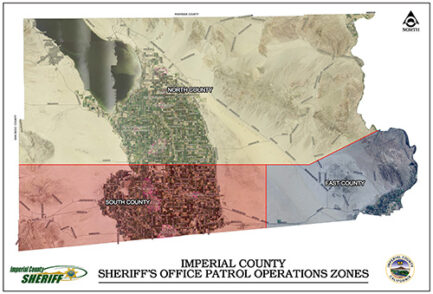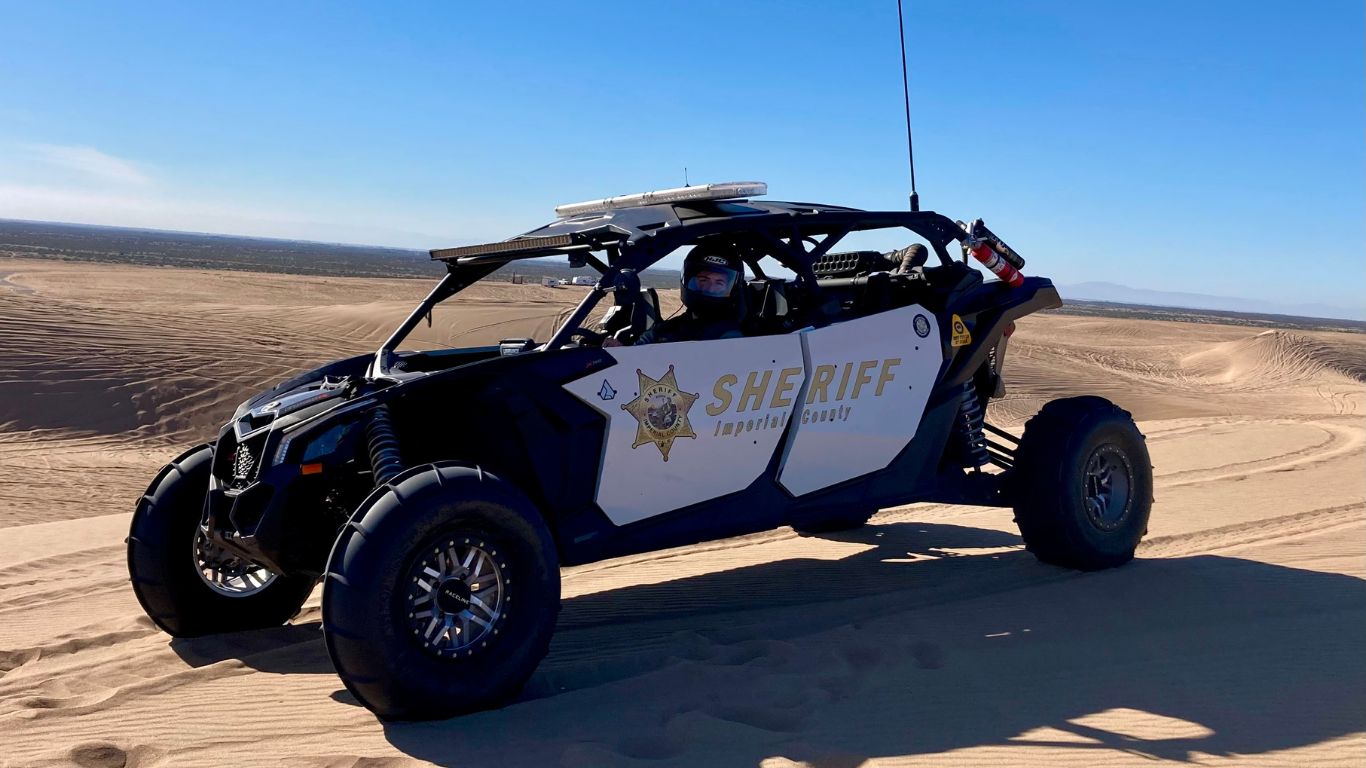Operations
Patrol
- Bombay Beach
- Niland
- Palo Verde
- Salton City
- Rural areas of Brawley, Calipatria and Westmorland
- Seeley
- Heber
- Rural areas of El Centro, Imperial, Calexico, and Ocotillo
- Winterhaven
- Bard
The ICSO deputies respond to past occurred crimes as well as in progress crime, conduct traffic control and enforcement. Patrol Deputies also perform many community policing functions and contribute to the investigative role through diligent follow-up. The patrol division takes great pride in serving the Imperial County and constantly tries to improve the lines of communications between its citizens and the communities we have sworn to protect.
The Patrol Division is directed by a Lieutenant.
- Off Highway Vehicle Safety Enforcement Team (O.H.V.E.S.T.)
- Boating Enforcement Safety Team (B.E.S.T.)
Investigations

The Imperial County Sheriff’s Office’s Investigations Division is comprised of two Sergeants, seven Investigators, one Task Force Officer assigned from the United States Border Patrol. The Investigator’s assigned to the Investigations Division are highly trained; task specific Sheriff’s Deputies to handle the most egregious and sensitive offenses and incidents above the resources of the Patrol Division
The Investigation Division is responsible for all investigations concerning homicides, officer-involved shootings/death, major assaults, sexual assaults, kidnappings, burglaries, robberies, thefts, fraud, identity theft, Internet Crime Against Children (ICAC), and any other criminal trends within the Imperial County. The Investigation Division is also responsible for all Imperial County Jail investigations.
The Investigation Division has two Investigators responsible for registering and tracking all sex registrants living within the Imperial County and is a member of the San Diego Internet Crimes Against Children Task Force (ICAC).
The Investigation Division researches, builds, and implements operations to address criminal activity within the Imperial County. The Investigators also assist patrol with surveillance and/or apprehension operations and any other requests, and focuses law enforcement efforts on identified career criminals operating in the Imperial County.
Coroner Division
The Coroner’s Office is an investigative unit responsible for carrying out the statutory duties of the Coroner. Those duties include investigation into the circumstances surrounding all deaths falling within the Coroner’s jurisdiction for the purpose of determining the identity of the deceased, the medical cause of death, the manner of death, and the date and time of death.
Medicolegal death investigations are conducted countywide on all homicides, suicides, accidents, suspicious, and unexplained deaths.
Other duties include notifying the next of kin, safeguarding personal property, collection of evidence, and completion of mandatory records and documents.
The Coroner’s Office is also proactive in the community, participating in awareness programs geared toward preventing drunk driving and drug use; consumer products causing fatal injury, domestic violence, child abuse, and elder abuse; and providing educational services for medical, legal, and law enforcement professionals. Other contributions to the community include cooperative relationships with non-profit organ and tissue procurement agencies to enhance the quality of life and save lives.
The unit also collaborates with research organizations pursuing medical science advancements.
Contact
- All deaths must be reported to the Imperial County Sheriff’s Office Communications Center at (442)265-2021.
- The Coroner’s Office is located within the main building of the Imperial County Sheriff’s Office.
- The Imperial County Jail is also located in this building. We are open 8am – 5pm, Monday-Friday, except holidays.
Directions from Interstate 8 in El Centro, CA:
- Take 4th Street (Hwy 86) south to stoplight at McCabe Road & turn west on McCabe Road
- Continue west on McCabe Road to 4-way stop at Clark Road (8th St) & turn south on Clark Road
- Take first right onto Applestill Road (N Loop) Sheriff’s Office will be at the end of Applestill Road (on left)
The Coroner processes
This information is intended to help families that suffered a recent death of a loved one or will soon lose a terminally ill family member.
For the terminally ill: (Have all necessary information readily available)
- Hospice contact info (if applicable)
- Info for Primary Medical Care Physician
- DNR (“do not resuscitate” order, contact doctor for more information on DNR’s)
- Mortuary contact info (contact if applicable)
When the time comes and you suspect your loved one has died, the death has to be confirmed by law enforcement or medical professionals. Fire Dept., Police, Ambulance, and Hospice personnel are among professionals that commonly respond to deaths and can be responsible for confirming the death.
Death of a loved one:
- For expected deaths of hospice patients call hospice.
- For all other deaths (unexplained, homicides, suicides, or accidental) call 9-1-1.EMS or Police personnel will likely call Coroner’s Office or a mortuary of the family’s choice.
- All deaths suspected to be accidental (falls or injury related), suicide, homicide, or unexplained deaths must be reported to the Coroner.
- If Coroner Investigator responds, your loved one will be taken to the Imperial County Coroner Facility. This facility is a secured facility, therefore we do not disclose its address.
- The Coroner’s Office will release your loved one after all examinations are completed and our office receives a signed Coroner release form from your mortuary.
- The Coroner’s Office will determine if an autopsy is needed, generally autopsies are scheduled twice a week, however, the Coroner Investigator can provide you with more specific information.
- The Coroner’s Office does not have the resources or facilities for viewing decedents, therefore any viewing will have to be scheduled by your mortuary at its facility.
- The Coroner’s Office or primary care physician is responsible for signing the death certificate and copies can be obtained through the mortuary or by contacting one of these two departments:
Imperial County Public Health Department
935 Broadway St.
El Centro, CA 92243
(442)265-1440
Imperial County Recorder
940 Main St.
El Centro, CA 92243
(442)265-1076
- Cause of death is not always known immediately after autopsy, in some cases the Coroner’s Office must conduct toxicology testing, microscopic examinations, or other tests, to determine or confirm the cause of death and this process can take several weeks.
- If cause of death was listed as pending, the final cause(s) of death will likely be submitted approx. 90-120 days after the autopsy date. In most cases a “pending” cause of death will not delay any funeral services. The decedent’s body will likely be ready for release immediately after autopsy. The Imperial County Coroner’s Office does not charge any removal or autopsy fees at this time.
In Imperial County, San Diego Eye Bank, Save A Life America, and the Life Saving are our local organ and tissue procurement organizations.
Deaths that fall under our jurisdiction require our approval for donation, and we do all that is possible to allow procurement in every case where donation is desired by the family. These arrangements are made by these organizations, and if a loved one is in a position to donate and meets the requirements, they will contact you to discuss the option to donate. We encourage organ and tissue donation, and approve the vast majority of donation requests under our jurisdiction, however there are rare exceptions where limits may be placed due to the nature of the death or the involvement of law enforcement.
Why is the Coroner involved in the death of my loved one?
All unnatural deaths must be investigated by the Coroner. That includes homicides, suicides, and accidental deaths. In the case of a suspected natural death, the decedent’s Medical Doctor will provide a cause of death. If that doctor cannot or has not seen the decedent in the past 20 days prior to the death, the Coroner will likely be notified.
Is an autopsy needed?
Not always, but in most cases it is mandated by law. About half of the cases investigated by the Coroner require autopsies to determine the cause of death. In some cases, where a natural death is suspected, a Forensic Pathological Medical Review will be conducted by the Forensic Pathologist. This consists of an external examination, to rule out trauma, and a review of the decedent’s medical records.
Will my loved one still be able to have an open casket if an autopsy is performed?
Yes, unless the decedent’s body was not suitable for viewing prior to autopsy (i.e. significant trauma to face, decomposed bodies). Autopsies are conducted in a professional manner and do not affect the viewing of the decedent. These decisions will be up to the family and the mortuary.
Can I see my loved one at the Coroner facility?
No. The Coroner’s Office does not have a facility for public viewings. A viewing can be arranged with your contracted mortuary once your loved one is transferred to the mortuary.
Can my loved one still be an organ donor if they are under the jurisdiction of the Coroner?
In most cases yes. If the family expresses interest in donation, we can contact our local organ donation organization, LifeSharing. A determination will be made if the donation will impede us from determining the cause of death.
What does the family do now?
Contact a mortuary and contract their services. They will assist you in selecting the type of services for your loved one. They will work closely with us to arrange the release of your loved one from our facility.
How can we have a burial for my loved one in Mexico?
The family would have to contract with a mortuary in the US and with a mortuary in Mexico. Bodies must be embalmed to be transported across state lines. Our local mortuaries are very familiar with this process and would be the ones helping you with this process. In cases of a death of a Mexican Citizen, the Mexican Consulate in Calexico, CA, can usually provide some assistance or guidance in this process. They can be reached at 760-357- 3863. Most consulates from other countries assist their citizens with similar services.
Can you recommend a company that can clean up the death scene?
We cannot recommend any companies, but the California Department of Public Health maintains a list of “Registered Trauma Scene Waste Management Practitioners.” Refer to the list for the location of the closest companies.
How can the next-of-kin reclaim property taken by the Coroner’s Office?
Contact the Coroner’s Office at (442) 265-2105. Property will be inventoried and can remain with the decedent when he is transferred to your mortuary. Otherwise, the property can be released to the legal next-of-kin or another person with written authorization from the legal next-of-kin only after it has been approved by the Coroner’s Office.
How long will my loved one be at the Coroner’s facility?
Generally the decedent will be available to be released the day of autopsy. Autopsies are usually conducted twice a week, Tuesdays and Fridays, but this schedule is susceptible to change. The Coroner Investigator handling your loved one’s case will try to give you the date of autopsy if it is known at that time.
How can I find out the cause of death?
Next-of-kin can call the Coroner’s Office in the afternoon on the day of autopsy. In most cases the cause of death will be known. In some cases requiring toxicology testing, microscopic examination, or other tests the cause would be listed as pending. The cause of death on “pending” cases will not be known until all tests are in and the Forensic Pathologist submits the autopsy report. This is generally within 90-120 days after the autopsy date.
Are there any Coroner fees?
No. At this time the Coroner’s Office does not charge any fees for the transportation, autopsy, or investigation.
What type of reports will be generated by the Coroner’s Office?
If a case is deemed a Coroner case, a Coroner Investigative Report will be completed. If an examination or autopsy is conducted by the Forensic Pathologist, an Autopsy report will be generated. If any other testing is done (i.e. Toxicology) then that report will also be available.
Can I get a copy of the reports? Is there a charge?
Please contact the Coroner’s Office for this service. Coroner Investigative reports are $40.00, Autopsy reports are $25.00, and any additional reports (i.e. toxicology…) are $25.00. In most cases the total will be $90.00 for the three reports. The report cannot be released until the case has been closed, generally between 90-120 days after the date of death. At this time the Coroner’s Office provides one copy to the next-of-kin free of charge.
What happens if the family does not have any money for funeral costs?
The Imperial County Public Administrator handles indigent burials. Please contact their office for assistance: (442) 265-7000. They are located at 778 W. State St., El Centro, CA 92243
Where can I get a copy of the death certificate?
A certified copy of the death certificate can be requested at your mortuary and is sometimes included in the mortuary fees. Other copies can be obtained at the Imperial Count Health Dept. (442)265-1444, or the Imperial County Recorder’s Office (442) 265-1076.
How soon can I get a copy of the death certificate?
Once the cause of death is known the Coroner’s Office or Primary Care Physician will be responsible for signing the death certificate. It is usually completed within a couple of days after the death, however your mortuary will be responsible for registering the death certificate, which is done once a disposition date is known (date for funeral / cremation / etc..). The registering of the death certificate could take weeks. Contact your mortuary for more information.
The cause of death says pending on the death certificate; can this still be used for legal purposes?
Yes. Once the death certificate has been registered, a certified copy can be used for legal purposes (i.e. handling of bank accounts, insurance, social security, bills, etc…). If an organization requires other documentation or more information from the Coroner’s Office, please contact us or have them call us. An amendment to the death certificate will be submitted once the official cause of death is known; this will likely be 90-120 days after autopsy.
Who do I contact if I have any questions regarding my loved one’s case?
The Coroner Investigator who responded to the death scene will likely be responsible for the investigation. If you did not get the contact information you can call our office at (442) 265-2105. Our office is open Monday-Friday (except holidays) 8am-5pm. You can also email our office at: coroners@icso.org
What happens if a body has not been identified?
If a body is not identified on scene, the Coroner’s Office will attempt everything from fingerprinting, checking missing persons database, contacting Mexican Consulate (if applicable), Odontology, DNA analysis, to posting the case online in the National Missing and Unidentified Persons System (NAMUS.GOV). “Namus” is a website for the public and for law enforcement agencies to list missing persons, unidentified deceased persons, and identified- unclaimed deceased persons.
Scientific Investigations Unit
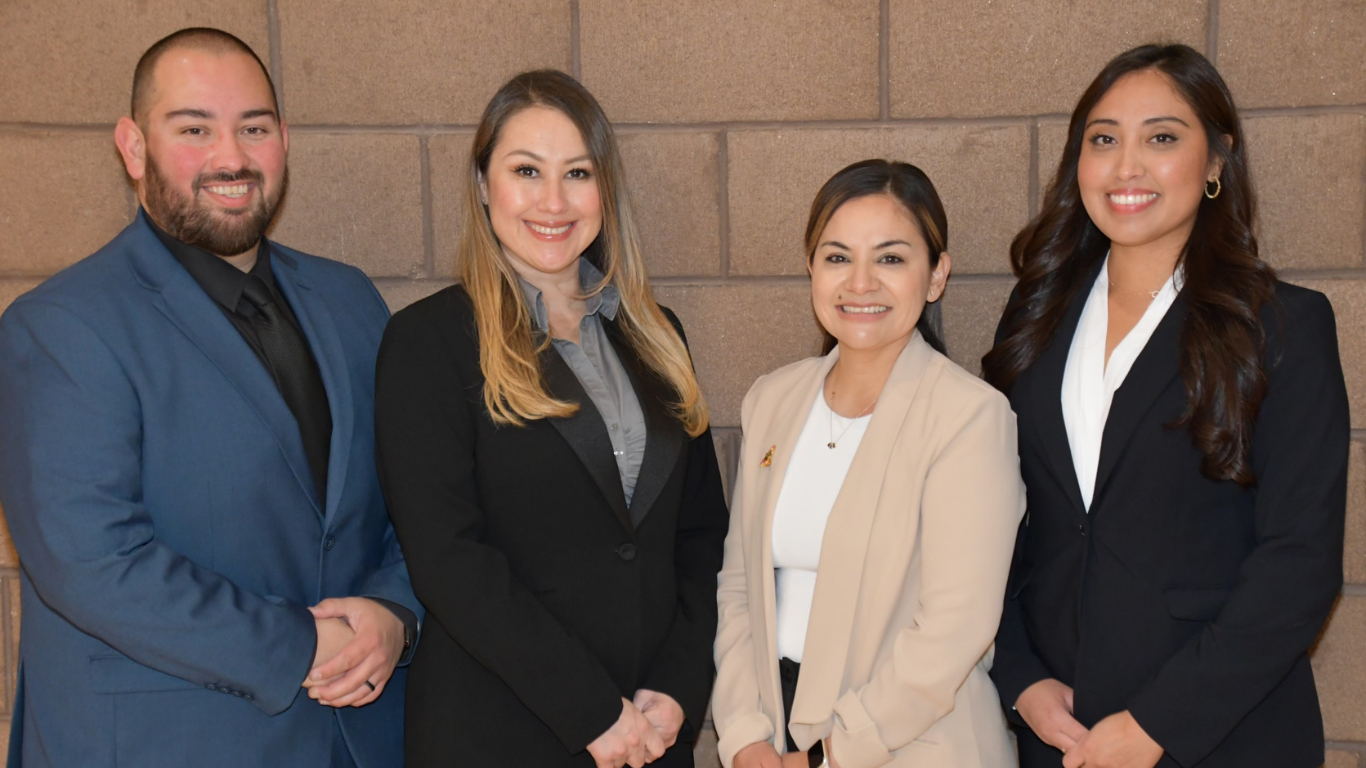
The Scientific Investigations Unit (SIU) is the only civilian staffed investigative unit of the Sheriff's Office. The specially trained SIU personnel support Patrol, the Investigations Units of the Sheriff's Office as well as the Coroner Unit.
SIU personnel are trained in crime scene investigation, DNA collection, fingerprint and palm print identification, shoe and tire impression identification, and California property and evidence laws. If you have items that have been retained for an investigation, processing or safekeeping, contact the SIU to check on the status or possible release. Evidence is released by appointment only.
All property releases require an appointment. Please call (442) 265-2053 to schedule an appointment. No property will be released without an appointment.
Guns that have been retained for safekeeping or as evidence may not be released without a California Law Enforcement Gun Release (LEGR) document. The LEGR may be downloaded below, then sent to the California Department of Justice with the appropriate fees. Once an eligibility letter is received, you will have 30 days to bring your letter to the Sheriff's Office. Once you bring in your letter, the SIU staff will check your eligibility to receive your weapon. If you are eligible, the weapon will be released to you minus any ammunition. No ammunition will be released.
Volunteer Services
Service and dedication are just a few of the words that describe those who serve the residents and visitors of Imperial County as members of our Volunteer Services. These men and women are marvelous volunteers who give of their time, talents, and resources to help further the mission of the Sheriff’s Office and protect the people of Imperial County.
The Imperial County Sheriff’s Volunteer groups include: The Sheriff’s Reserve Deputies, Mounted Posse, Aero Squadron, Sheriff's Cadet Post 4500, De Anza Rescue Unit, and Sheriff’s Activities League. Each volunteer group is a separate unit, and performs different functions from each other. As Imperial County grows in population and popularity, the demand for their services increases each year.
De Anza Rescue Unit was formed in 1969, when a young child became lost from his family during an outing at Mt. Signal. Today, DARU’s specific purpose is search and rescue, including medical assistance of injured, trapped, lost or stranded persons in the mountains and deserts of Imperial County, CA. If needed, DARU will travel to other counties to assist in any search and rescue missions.
The Sheriff’s Posse of Imperial County was established in 1938 under the guidance of Sheriff Robert W. Ware. The Posse was formed for a distinctive purpose, and to serve by providing mounted security for large events, such as the California Mid-Winter Fair, and KXO’s Freedom Fireworks event. The presence of armed, trained horse-mounted officers gives pause to any criminal element contemplating mischief at an event where the Posse rides. Posse members are required to have completed firearms and arrest training (PC832 Certification) and attend Reserve Deputy Level III within their first two years of admission to the Posse.
The Imperial County Sheriff’s Aero Squadron are comprised of men and women, who “take to the skies” when an aerial view is needed, for search and rescue missions, or to assist the Sheriff’s sworn deputies needing to collect data information of our deserts and waterways. The Aero Squadron is activated under the direction of the Sheriff, and when flying, is a team of two: pilot and observer. The airplanes are privately owned by the Aero Squadron member pilots, and must obtain a valid pilot’s license. The observer assists the pilot by keeping a watch for other airplanes in the air, and taking aerial photos during the flight mission.
Sheriff's Cadet Post 4500 is for youths interested in law enforcement, between the ages of 14 to 18. Post 4500 is the oldest law enforcement specialty post in Imperial County, specializing in all aspects of law enforcement: from jail visitation, dispatch communications, to crime scene preservation, to patrol procedures. Sheriff's Cadet Post 4500’s objective is to introduce post members to current law enforcement standards, concepts, ideas, and techniques under the direction of sworn law enforcement officers and Post advisors.
The Reserve Deputy Sheriff unit is a volunteer organization whose primary mission is to augment patrol operations. Reserve Deputies are routinely deployed to provide security at public events, such as the Imperial County Fair, parades, community events, and election details. In addition, Reserve Deputies assist Investigators and the Sheriff’s Off Road Unit. Reserve Deputies perform duties in accordance to their training and classification (Level I or II).
Who may I contact for more information? You can contact Lieutenant Robert Benavidez (Reserve Coordinator) by e-mail RBenavidez@icso.org. You may also inquire about specific job related questions for full-time sworn or general nonsworn positions.
What are the application steps to be considered for Reserve Deputy Sheriff? Below is a list of the steps in the application process. You will need to successfully pass each step of the process to move forward.
- Complete County of Imperial Application Written Examination
- Physical Agility Test (PAT)Completion of a background packet
- Extensive background investigation, including interview
- Polygraph Examination
- Pre-employment Psychological Examination
- Medical Examination, including a pre-employment drug and alcohol screening
Deliver the application to:
Reserve Deputy Coordinator
328 Applestill Rd.
El Centro, CA 92243-2839
We are currently taking applications from those individuals who possess:
- A reserve Level One Certificate or
- A reserve Level Two Certificate or
- A reserve Level Three Certificate with proof of current enrollment in a Level Two program. In order to be considered for this opening your certificates must have an expiration date greater than six months from the date your application was submitted.
Deputy Sheriff Recruit minimum requirements
Age: 20 ½
Citizenship: US citizen or permanent resident alien who is eligible and has applied for citizenship
Education: Graduation from an accredited or approved US high school or equivalent
Reading and Writing Ability Assessment: Assessment of reading and writing ability
Oral Interview: Assessment of oral communication skills and other factors
No Felony Convictions; Fingerprint and Criminal History Check: Fingerprints sent to the California Department of Justice (DOJ) and the Federal Bureau of Investigation (FBI)
Medical and Psychological Evaluations: Evaluations conducted by licensed physicians and/or psychologists employed by IC Human Resources
Background Investigation: Thorough background based on applicant’s personal history statement/questionnaire
Physical Ability Testing
- Obstacle Course: Run a 99-yard obstacle course consisting of several sharp turns, a number of curb-height obstacles, and a 34-inch high obstacle that must be vaulted.
- Body Drag: Lift and drag a 165-pound lifelike dummy 32-feet.
- Chain Link Fence: Run 5 yards to a 6-foot chain link fence, climb over fence, continue running another 25 yards.
- Solid Fence Climb: Run 5 yards to a 6 foot solid fence, climb over fence, continue running another 25 yards.
- 500-Yard Run: Run 500 yards.
Each of the five events is timed. Candidate’s performance times are converted to points, and summed. A passing score must be obtained as set by IC Human Resources. (Therefore, faster times equal higher scores).
Applications must be completed and delivered at 328 Applestill Road (administration office), El Centro, CA 92243
Specialized Units

Imperial County is considered a High Intensity Drug Trafficking Area (HIDTA). The Imperial County Sheriff’s Office has deputies attached to task forces that work with the Federal Drug Enforcement Administration and other agencies to target both high level drug dealers and street level sales.
Narcotic Investigators focus on crimes involving the
- Sale, possession and distribution of illicit drugs
- Cases involving seizures of property
Investigators assigned to these task forces have been responsible for arresting several suspects for various narcotic related crimes and for the seizure of large amounts of narcotics, firearms and assets.
- The Imperial County Sheriff’s Underwater Recovery Team (ICSURT) provides search and recovery services for the county and its allied agencies.
- ICSURT is called out for underwater searches and recoveries of evidence, vehicles, and people in the canals, lakes, rivers, etc. located in the Imperial County.
- ICSURT works closely with the Imperial Irrigation District Dive Team, as well as USBP BORSTAR divers.
- ICSURT currently has six (6) certified open water divers and three tenders. Each team has three divers. Each three man team is on call for two weeks a month. While on call, the divers are subject to call out to respond to water related emergencies.
O.H.V.E.S.T. is located at 328 Applestill Road. O.H.V.E.S.T. is funded through, California OHV Grants and California OHV Green Sticker funds.
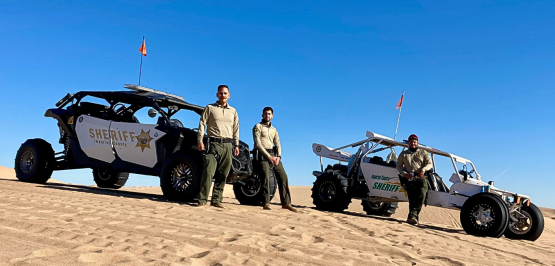
Imperial County Sheriff’s Office Off Highway Vehicle Enforcement Safety Team (O.H.V.E.S.T.) O.H.V.E.S.T. is committed to provided safety, security and education to the resident and visiotrs of Imperial County’s vast off highway recreational areas. To accomplish this mission we provide education and information to members/visitors of the off highway community, enforce state and local ordinance to ensure safe OHV operation, and train and prepare for emergency response in case of OHV accident, medical response, search and rescue or natural disaster. O.H.V.E.S.T. uses a variety of vehicles and methods, including ATV’s, UTV’s, Sand Rail, and 4X4 trucks to assist in response.
Imperial County is the tenth-largest (of 58) county in California. OHV recreation is one of the most popular activities within the county for residents and visitors alike. OHVEST provides law enforcement services to all public lands and OHV recreational areas within the Imperial County. These areas include:
- Imperial San Dunes Recreational Area (ISDRA – Glamis/Buttercup) – 159,072 Acres
- Superstition Mountains – 13,000 Acres
- Plaster City – 41,000 Acres
- Ocotillo Wells SVRA (State Vehicle Recreational Area) – 85,000 Acres
- Heber Dunes SVRA (State Vehicle Recreational Area) – 343 Acres
- Truckhaven – 25,000 Acres
The O.H.V.E.S.T. team consists of 1 Lieutenant, 1 Sergeant, 2 Deputies, and an Office Assistant III.
For more information contact Sgt. Manuel Cacatian, 328 Applestill Road, (442) 265-2601 or email mcacatian@icso.org.

The Imperial County Sheriff’s Office maintains a team of trained and equipped deputies that handle unique situations that are not common for normal operations. This specialized team is known as Sheriff’s Emergency Response Team commonly referred to as S.E.R.T.; the public may know it as S.W.A.T.
Some of the primary operations of S.E.R.T. are:
- Conduct high risk search warrants
- Arrest warrants
- Deal with an array of rapidly evolving situations that may involve barricaded suspect(s), hostage taker(s), active shooter(s).
Requirements and responsiblities of all potential and active S.E.R.T. members include:

- Highly disciplined deputies
- Possess high level of capacity to deal with difficult situations
- Monthly Trainings
- Demonstrate a high level of tactical firearm proficiency
- Maintain a peak level of physical fitness
- Successfully complete physical and cognitive evaluations

All S.E.R.T. members train monthly and have demonstrated a high level of tactical firearm proficiency. S.E.R.T. members are required to maintain a peak level of physical fitness so that they may consistently handle extraordinary situations that require a high level of performance. Imperial County’s S.E.R.T. members are highly disciplined deputies that have demonstrated a high level of capacity to deal with difficult situations. All potential S.E.R.T. candidates must successfully complete a strenuous physical and cognitive evaluation that includes a weapons proficiency test, physical fitness test and a psychological evaluation. These high standards must be met by each candidate to ensure the Imperial County’s S.E.R.T. team maintains a group of members that are highly skilled, dependable, and precise and understand the core principles of team work.
Imperial County’s S.E.R.T. utilizes specialized equipment and vehicles such as the Lenco Bearcat and L3 Communications Range-R. Members are on call 24 hours a day, 7 days a week, and take great pride in what they do.
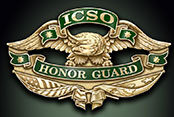
The ICSO Honor Guard Unit (ICSO HG) represents the Imperial County Sheriff’s Office, Deputies, Correctional Officers and their families at Law Enforcement Ceremonial Events. Events include Law Enforcement funerals, parades, and ceremonial occasions either solemn or festive.
Military history reveals that Honor Guards Units have been a part of its rich traditions for centuries. The members of the ICSO HG Unit have committed themselves to continue these traditions and to being the integral part of the department’s support mechanism for families of fallen officers.
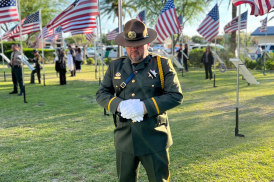
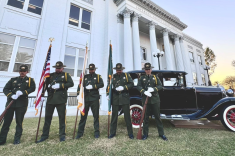
Members of the ICSO HG Unit attend a rigorous two week Honor Guard Academy in which they learn standardized protocols for uniformity in the conduct of drill and ceremonies. Members continue this precision art, attention to detail with monthly training as they have grown to be a well equipped and trained Honor Guard Unit that is frequently called upon to represent the Imperial County Sheriff’s Office.
The ICSO HG Unit regularly participates in the Imperial Valley Lawservices that pay tribute to fallen officers in the County of Imperial.
Duties of an ICSO HG member include:
- Drill and Ceremony
- Color Guard
- Rifle Volleys (21 Gun Salute)
- Pall Bearers/ Casket Carry
- Honor Watch
- Flag Folding
Other Honor Guard ceremonial events include:
- Imperial County Sheriff’s Office Annual Inspection
- Government Grand Opening Ceremonies
- State and Local Police Memorial Services
- Community Events
- Parades
Mission: “Providing safety, security, and education to the recreational enthusiasts of Imperial County’s public lands and waterways.”
Imperial County Sheriff’s Office Boating Enforcement Safety Team (B.E.S.T) is committed to enhancing the safety and security of the residents and visitors to Imperial County’s Waterways/Recreational areas. To accomplish the mission, we provide education and information to members of the boating community, enforce State and Local ordinance to ensure safe boat operations, and train and prepare for emergency response in case of a vessel accident or natural disaster.
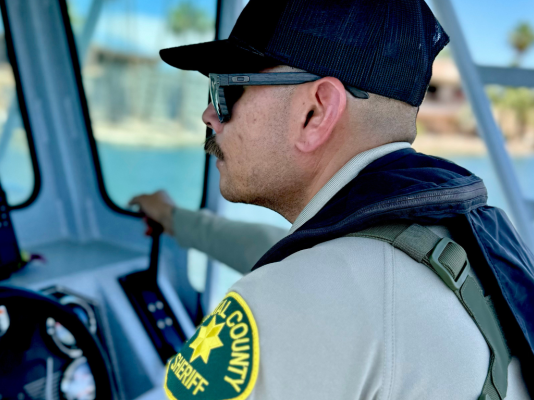
B.E.S.T. is located at 328 Applestill Road, El Centro, CA. B.E.S.T. is funded through California Boating and Waterways Grant provided by California Division of Boating and Waterways. Information regarding boating requirement, safety and education, and maps of the lower Colorado River from Blythe to Imperial Dam can be found on http://www.dbw.ca.gov/.
B.E.S.T. provides law enforcement services to all waterways within the County of Imperial. These waterways include:
- Salton Sea – 525 Square Miles
- Bard Lake – 5 Square miles
- Senators Wash – 8 Square Miles
- Ferguson Lake – 5 Square Miles
- Sunbeam Lake – 3 Square Miles
- Ramer Lake – 8 Square Miles
- Oxbow lake – 4 Square Miles
- Pretty Water lake – 4 Square Miles
- Clear Lake – 5 Square Miles
- Finney Lake – 6 Square Miles
- Wiest Lake – 4 Square Miles
- Squaw Lake – 5 Square Miles
- Little Squaw Lake – 3 Square Miles
- Taylor Lake – 4 Square Miles
- Colorado River – 83 Square Miles
- Palo Verde Outfall – 8 Square Miles
Frequently Asked Questions (FAQ's)
1. What is the age limit to operate a boat?
No person under 16 years of age may operate a motorboat of more than 15 horsepower, except for a sailboat that does not exceed 30 feet in length or a dinghy used directly between a moored boat and the shore, or between two moored boats. The law allows persons 12-15 years of age to operate motorboats of more than 15 horsepower or sailboats over 30 feet if supervised on board by a person at least 18 years of age.
2. What is the law for wearing a life jacket?
All children under 13 years of age are required to wear a U.S. Coast Guard-approved life jacket while on board a vessel that is 26 feet or less while underway. Any person on board a Personal Watercraft, such as a jet ski, or any person being towed behind a vessel (as in water skiing or knee-boarding) must wear a U.S. Coast Guard-approved life jacket. If you are operating a boat, canoe or kayak of any length, you must carry a U.S. Coast Guard-approved life jacket for each person on board, regardless of age. If stored, they should be readily accessible.
3. How and when is it necessary to report a boating accident?
You must make a written report of a boating accident to the Department of Boating and Waterways when a person dies, disappears, or is injured and requires medical treatment beyond first aid. Also, a report to the Department of Boating and Waterways must be made if there is damage to any vessels involved or other property that equals or is greater than $500 or there is complete loss of a vessel. Forms are available through most Sheriff's and harbormaster's offices, and many police departments.
4. Do I have to register my boat?
Yes, every sail-powered vessel over eight feet in length and every motor-driven vessel that is not documented by the U.S. Coast Guard which is used or on the waters of this state must be registered by the California Department of Motor Vehicles.
5. What are the rules for operating a Personal Watercraft (PWC)?
- Every person on board of a PWC must wear a U.S. Coast Guard-approved life jacket.
- If the PWC has a lanyard cutoff switch, the operator must attach the lanyard to his or her person.
- PWCs may not be operated between sunset and sunrise.
- To operate a PWC designed for one person, the operator must be 16 years of age or older. A person 12-15 years of age may operate a PWC designed to carry two or more persons if the operator is supervised on board by a person 18 years of age or older.
- Every PWC shall have a U.S. Coast Guard marine grade fire extinguisher onboard.
- Every PWC shall have registration onboard.
- Every PWC shall have a sound device onboard.
6. What are the rules for operating a boat?
- The operator is responsible for the boat and its occupants.
- Every boat shall have a sound device.
- Every boat shall have a U.S. Coast Guard approved Type 4 throwable device, and shall be readily accessible.
- Every boat shall properly display the registration numbers and have registration onboard.
- Every boat shall have U.S. Coast Guard marine grade fire extinguisher onboard.
- Every boat shall carry U.S. Coast Guard-approved life jacket for each person on board.
- No person under 16 years of age may operate a motorboat of more than 15 horsepower, except for a sailboat that does not exceed 30 feet in length or a dinghy used directly between a moored boat and the shore, or between two moored boats. The law allows persons 12-15 years of age to operate motorboats of more than 15 horsepower or sailboats over 30 feet if supervised on board by a person at least 18 years of age.
7. What are the rules for water skiing?
- When using a boat to tow someone on water skis or an aquaplane, there must be an additional in the boat other than the operator, with a minimum age of 12, to observe the skier. The observed must also have a red or orange water ski flag to indicate a downed skier.
- The skier must wear a Type 1, 2, 3, or 5 personal floatation device (PFD).
8. Do I need a license to operate a boat?
You do not need a license to operate a boat in California.
9. Is it illegal to drink alcohol on a boat?
It is not illegal to drink alcohol on a boat as a passenger. It illegal to operate a vessel while under the influence of alcohol or drugs. The blood alcohol limit for boating is the same as that for driving a car - 0.08%.
10. Who patrols the Colorado River?
Both California and Arizona Law Enforcement Agencies have jurisdiction on the Colorado River. 853.2(a) PC of the California Penal Code allows for both California and Arizona Law Enforcement Agencies to have jurisdiction within 25 air miles of any lake, or body of water that is part of the Colorado River.
11. Is there a speed limit on a boat?
Yes, in some areas there are no wake zones, where a boat is to not to exceed 5 miles per hour or cause a wake. Look out for water markers and buoys. All channels and back waterways are an example of no wake zones and you are not to exceed 5 miles per hour. Not all channels have water markers or buoys but must abide by this rule.
12. What are some rules of the waterways?
Just like on the roadways, vessels should operate on the right side of the waterway. If coming head on with another vessel, both vessels should alter their course to the starboard side (to the right) to avoid a collision. When traveling near bends through a channel where approaching vessels from the other direction cannot be seen, you should signal with a prolonged blast (sound device). Approaching vessels should answer with the same signal. If the signal is unanswered, the channel should be considered clear. When passing or overtaking another boat from the starboard side (right) you should give one blast with your sound device to show your intentions of overtaking on the starboard side (right). When passing or overtaking on the portside side (left) you should give two blasts with your sound device to show your intentions of overtaking on the portside side (left). When the vessel’s engines area going astern (in reverse), you should give three blasts with your sound device to show your intentions of operating your engines astern (in reverse).
13. Is taking a Boating Safety Course mandated, and where can I find one?
No, a Boating Safety Course is not mandated, unless you are court ordered. One example would be being court ordered to attend an approved National Association of State Boating Law Administrators, after being convicted of boating under the influence. For a list of National Association of State Boating Law Administrators, visit www.dbw.ca.gov/BoaterInfo/BSClassesAndCourses.aspx
14. What are the boating and launch areas in the Imperial County area and are there any associated fees?
(1) Sunbeam Lake Park
1750 Drew Road, Seeley, CA 92273
Day Use - $2.00 per vehicle
Fishing Permit - $2.00 per person
Boat Launch - $5.00 per boat/ski trailer per day
(2) Weist Lake Park
5351 Dietrich Road, Brawley, CA 92277
Day Use - $2.00 per vehicle
Fishing Permit - $2.00 per person
Boat Launch - $5.00 per boat/ski trailer per day
(3) Palo Verde Park
Highway 78, 1.5 miles south of
Palo Verde, CA 92266
Day Use - $2.00 per vehicle
Fishing Permit - $2.00 per person
Boat Launch - $5.00 per boat/ski trailer per day
(4) Salton Sea Park
100225 State Park Road, Mecca, CA 92254
Day use area for - $5.00
Fishing, visitor center, picnic, birding, sightseeing - $30.00
Headquarters full RV hookups - $20.00
New Camp developed campground - $30
Boat Launch - $3.00
Below is a list of Colorado River Launch Areas
(1) Oxbow Camp Ground
Highway 78, 3 miles south of Palo Verde, CA 92266
Day Use - $10.00 per vehicle or $15.00 overnight per vehicle
(2) Senator Wash Park
Senator Wash Road, Winterhaven, CA 92283
Day Use - $10.00 per vehicle or $15.00 overnight per vehicle
(3) Squaw Lake Park
Senator Wash Road, Winterhaven, CA 92283
Day Use - $10.00 per vehicle or $15.00 overnight per vehicle
(4) Walters Camp
Walters Camp Road, Palo Verde, CA 92266
Day Use – Private location, see Walter’s Camp office for details
(5) Picacho State Park
26 miles north of Interpark Rd, Winterhaven, CA 92283
Day Use – Peak Season $8.00 None Peak Season $8.00 per vehicle
Sheriff’s Activities League (S.A.L.)
The Sheriff’s Activities League provides quality activities for the youth in Imperial County, with the goal to reduce juvenile crime and delinquency. The program’s activities are designed to pair law enforcement officers with young people to develop discipline, mutual trust, and respect.
Throughout the year S.A.L. has the following activities available:
- Boxing
- Judo
- Soccer
- Youth Leadership Program
- Flag football
For more information on S.A.L. programs within your respective area, please contact Tina Garcia: 442-265-6105
Crime Prevention
The purpose of the Crime Prevention Unit is the educational and promotional arm of the Sheriff’s Office. The Unit’s duties include, but are not limited to, parades, drug education, the Sheriff’s booth at the annual Midwinter Fair and Fiesta, Child ID, Neighborhood Watch, Home Security Inspections, school and public education, special events, and other such activities.
The Sheriff’s Activities League (SAL) is a 501 (C)(3) Corporation that has been assigned to operate within the Crime Prevention Unit. SAL is a youth oriented organization that combats juvenile crime by providing programs that build self-discipline, self-esteem and social skills. Some of the SAL activities include Boxing, Judo, Karate, Dance, Soccer as well as educational programs such as Mentoring and Summer Programs.
The CP/SAL Unit runs as ONE unit with duties that encompass two divisions. The CP/SAL Unit currently consists of: two (2) Crime Prevention Coordinator I (CPC I) positions; one (1) Crime Prevention Coordinator II (CPC II); and one (1) Crime Prevention Services Supervisor/SAL Executive Director position.
Bullying
The students are taught the different varieties of bullying and how to best handle those situations. The difference between “tattling” and “telling” are also discussed.
Grade level: 3rd – 8th Approximate time: 45 minutes.
Decision Making
Students are taught about consequences from making good and bad decisions. The concept of “what you do today, will affect your tomorrow” is heavily discussed. Peer pressure is a strong undertone for this presentation as well. This can be done in individual classrooms or done in an assembly-type setting.
Grade level: 4th – 8th. Approximate time: 45 minutes.
Personal Safety
This topic covers “stranger-danger” area awareness, and tips on handling yourself with a potential predator. The difference between “tattling” and “telling” are also discussed. This can be done in an assembly-type setting, but individual classroom setting is recommended for upper grades.
Grade level: Kinder – 8th. Approximate time: 20 minutes (for lower grades) & 45 minutes (for upper grades).
Drug Education
Designed for 3rd grade students; Students are taught about basic decision making, peer pressure, and personal responsibility. Legal gateway drugs, specifically tobacco and alcohol and the danger of misusing medication are also taught. An individual classroom setting is recommended. This can be done in an assembly-type setting, but individual classroom setting is recommended for upper grades.
Approximate time: 45 minutes, once a week for five weeks.
Drug Awareness
While the 3rd Grade Drug Education Program covers legal gateway drugs, this presentation covers the harsher realities of illegal substances and consequences of drug use. Peer pressure and decision making are also discussed. This can be done in individual classrooms or done in an assembly-type setting.
Grade level: 4th – 8th. Approximate time: 45 minutes.
Internet Safety and Social Media
Students are taught the importance of Online Identity and the responsibility of living in the World Wide Web. They are also taught the pros and cons of being online as well as safety measures to protect them from predators. Social Media is discussed regarding their “footprints” in the social media world and the importance of online good practices. Cybersafety including Cyber Bullying is heavily discussed.
Grade level: 3rd – 12th. Approximate time: 45 – 60 minutes.
Identity Theft
One of the most personal damaging crimes in America today! This presentation is given to many service groups and is widely asked for. It covers what to look for and how to deal with Identity Theft.
Approximate time: 45 – 60 minutes.
Safety Presentations
All safety presentations cover the safety measures a person should make. This topic can cover everything from stranger danger, home security, personal safety and holiday safety to Internet and social media awareness. Strategies and tactics are shown and taught to supplement the materials discussed.
Approximate time: 45 – 60 minutes
Drug Awareness
Information regarding the effect on the physical and mental wellbeing from illegal drug use is discussed. How to recognize drug use and what to do if help is needed is also included. In addition, a closer look at the legalization of marijuana and the new laws and impacts it has on youth and communities are included.
Approximate time: 60 – 90 minutes
Neighborhood Watch
Neighborhood Watch is a community based program designed for a group of people in a neighborhood to provide security in their community.
Home or Business Security Inspections
Utilizing Crime Prevention through Environmental Design, a Crime Prevention Coordinator will visit your home or business and inspect the area for any signs of weaknesses in security.
Operation Child ID
Through digital imaging, a child’s fingerprints and picture are printed out with an information sheet for parents to fill out and keep in a safe should their child become missing or abducted.
Drug Store
The Drug Store is a collaborative effort of multiple emergency, judiciary and law enforcement agencies which is headed by the Sheriff’s Office Crime Prevention Unit to display the harmful effects of drug use and the importance of making good choices. This program is offered to schools and targets 6th grade students.
Parades
The Crime Prevention Unit attends multiple parades throughout the year representing the Sheriff’s Office and coordinates participation for all Specialized Units and Volunteer Units. Parades attended throughout the year include multiple Christmas Parades, Veterans Day parade, Festival
Parades, Cattle Call Parade, Carrot Parade and many others.
National Night Out
Each year on the first Tuesday in August neighbors across the country are invited to turn on their porch light and spend an evening getting to know one another. National Night Out is an annual community building campaign that promotes strong police-community partnerships and neighborhood camaraderie to make our neighborhoods safer, more caring places to live and work. National Night Out enhances the relationship between neighbors and law enforcement while bringing back a true sense of community. Furthermore, it provides a great opportunity to bring police and neighbors together under positive circumstances.
Community and School Fairs
The Crime Prevention Unit attends multiple community and school fairs each year. Some of the fairs include multiple health fairs, safety fairs and career fairs. Also attended are fairs that are area specific such as the Children’s Fair. The Crime Prevention Unit offers informational materials that are specific to the attended event.
Community Events
The Crime Prevention Unit attends multiple community events each year such as Freedom Fest, The California Mid-Winter Fair, community festivals and many more.
- Crime Prevention Unit hours are Monday - Friday 8:00 a.m. to 5:00 p.m.
- Call 442-265-6100 for:
- Questions about crime prevention issues.
- To request an officer speak at your meeting.
Crime Prevention Services Supervisor
Tina Garcia
442-265-6105

